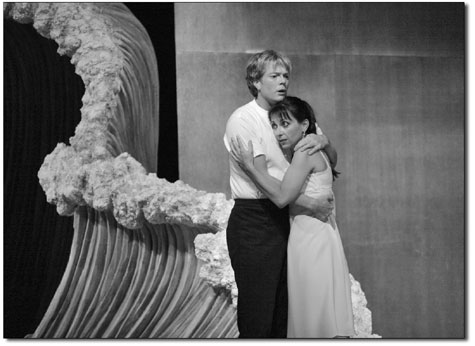|
| ||
| Domestic violence, domestic bliss
by Judith Reynolds When Carmen’s seductive song fails to ensnare Don José, she bites off a rose and tucks it in his pocket. Suddenly, the once upright soldier buckles. Carmen’s spell has been cast, and it’s downhill for him from that moment on. When Pamina entreats her lover, Tamino, to speak to her in Mozart’s “Magic Flute,” he keeps his vow of silence. All seems lost. But goodness reigns, and they unite in mature love. Love gone wrong, love gone right, both are featured in Santa Fe Opera’s splendid 50th season. Georges Bizet’s “Carmen,” a tale of obsession that ends in murder, and Mozart’s masterpiece stand in sharp contrast to each other. Because of their immense popularity, a classic tragedy and a brilliant comedy, the two operas have the most performances of the season. There’s plenty of time to see one or both, and if you’re a neophyte, what better time to discover the power of grand opera. Either would be a perfect choice. Santa Fe has a way of taking a fresh look at the classics. First produced in 1875, “Carmen” tells the tale of a beautiful, defiant Spanish gypsy. For Santa Fe, the Swedish director Lars Rudolfsson has time traveled to 1960 and Franco’s dictatorship. How appropriate for a story brimming with class and ethnic antagonism. Fascist military ideals contrast dramatically with the gypsy reverence for freedom. Rudolfsson has also focused on the human drama by paring down sets and costumes. No over-the-top vendors or donkey carts clutter the Spanish street. Instead, we see a bleak cigarette factory and crumbling walls. The gypsies hide out in an abandoned warehouse, not a camp in the mountains. The spirit of realism is what inspired Bizet, and this production honors the composer’s intentions – verismo, not romantic claptrap. The great Swedish mezzo, Anna Sofie von Otter, sings the title role with subtlety and power. Her Carmen stands defiantly tall among women and challenges men. If Carmen is the female Don Juan, as many have argued, von Otter knows how to spot, capture and discard her prey at will. Often cruel, she’s intensely confident about her charms. As a result, von Otter’s Carmen is not flamboyant. She underplays both the famous Habanera and the Seguidilla, letting the full shimmer of her voice blossom only on occasion. It’s the musical equivalent of the siren’s endless tease. With that level of intensity, von Otter’s Carmen needs a singer of equal range. The American tenor, William Joyner, matches her in subtlety and power. It is Don José who undergoes ferocious change, not Carmen. And Joyner makes his struggle heartrending. Don José’s desperation, murderous rage and final demise are truly tragic. Among Mozart’s many gifts, the ability to embed sadness within a comic opera is one of his truest. “The Magic Flute” has a quirky plot, but at its center two pairs of lovers have to overcome obstacles before they find happiness. With its swiftly moving scenes, “Flute” is Shakespearean in scope. It also has a huge cast of upper- and lower-class types and an intriguing blend of realism and magic, darkness and light. British director Tim Albery has opted for clarity and humor in everything from costuming to text interpretation. Adding to the general whimsy, designer Tobias Hoheisel outrageously mixes periods. Papageno (Joshua Hopkins), the loopy bird catcher, dresses in T-shirt and jeans with an oversize duckbill cap and yellow sneakers. Tamino (Toby Spence), is elegant in black britches and silver vestplate. The Queen of the Night (Heather Buck) parades in full Elizabethan dress. And the creatures come in one size only: monster. You won’t forget their entrances. French soprano Natalie Dessay, for whom the Queen of the Night’s show-stopping aria has become a signature, surprisingly sings the role of Pamina. With simplicity and touching softness, Dessay transforms a young princess into a mature partner for her prince. Spence elegantly takes Tamino through his trials, emerging triumphant through a brilliantly staged rite of passage. Conductor William Lacey and the opera orchestra deserve particularly high marks. And the interesting combination of sung German and somewhat colloquial spoken English worked for me, though it might not for everyone. So did the minimalist set. Wit lies behind everything – from Mozart’s music to the tribe of little Papagenistas that scamper out at the end to populate the world with laughter. •
|
In this week's issue...
- December 18, 2025
- Let it snow
Although ski areas across the West have taken a hit, there’s still hope
- December 18, 2025
- Look, but don't take
Lessons in pottery theft – and remorse – from SW Colorado
- December 11, 2025
- Big plans
Whole Foods, 270 apartments could be coming to Durango Mall parcel


